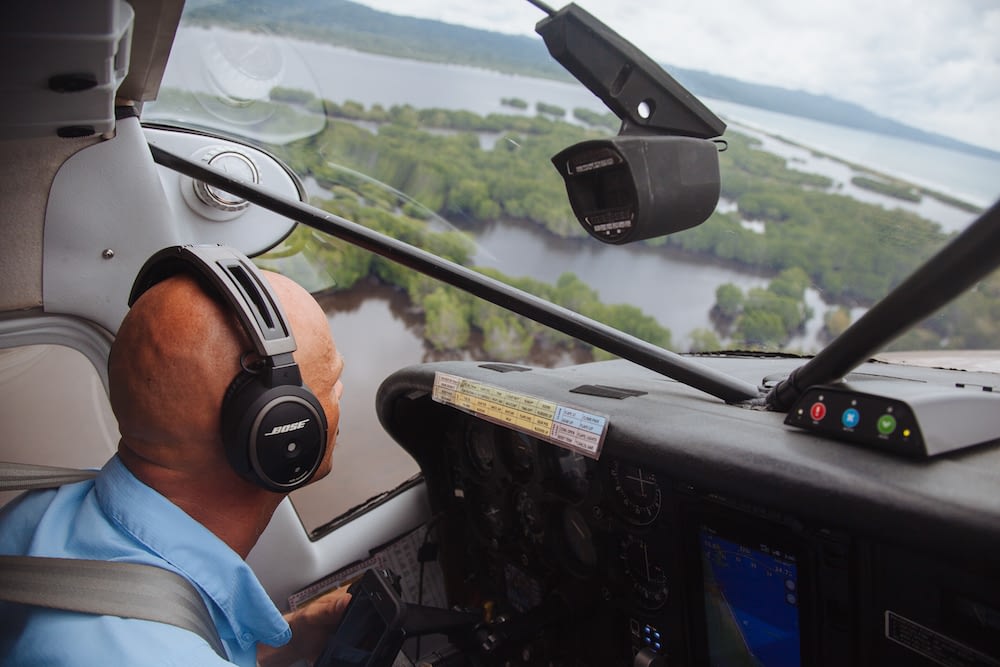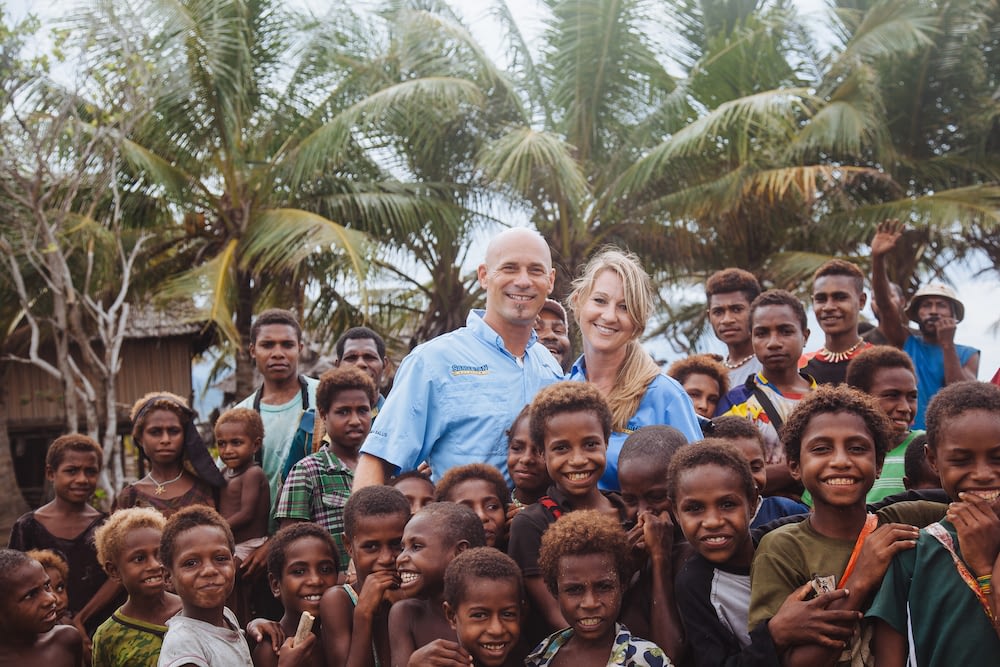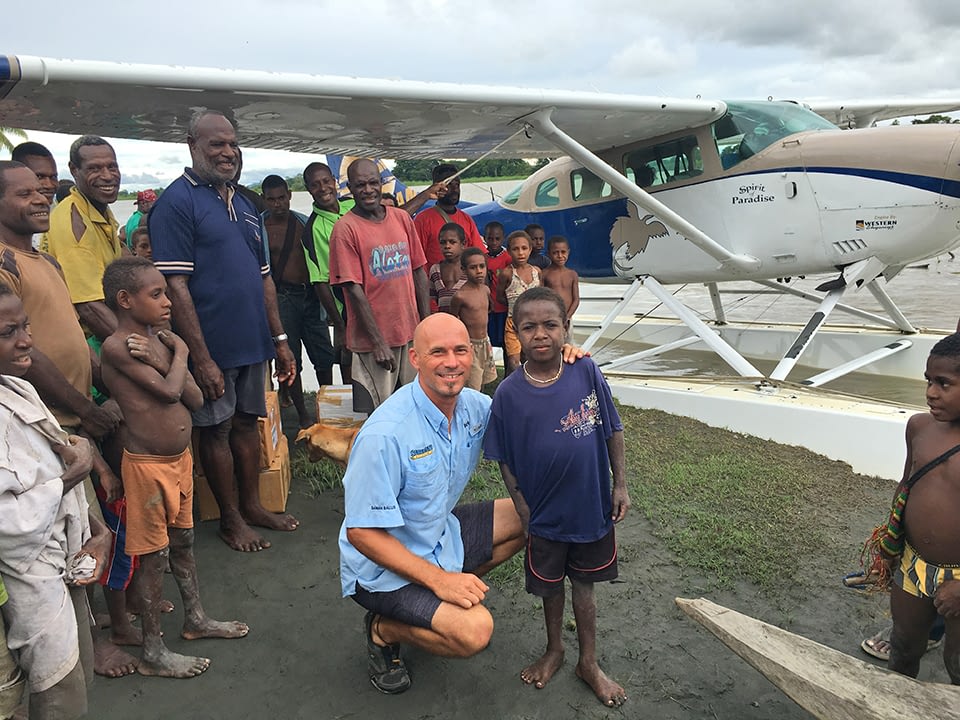FLYING MIRACLE
“I realized all the years of struggle to set up Samaritan Aviation had been worthwhile. We had just saved the lives of a mother and her baby.”

Richard Andrews reports on good samaritan Mark Palm who is saving lives and delivering vital medical supplies in remote PNG with his air ambulance service.
“The vision of a free emergency service with a floatplane that could land on Sepik waterways came from that trip,” says Palm. However, it was a long journey to set up Saman Balus, as it’s known locally. Palm returned to the US, learned to fly, enrolled in an aircraft engineering school and spent a decade raising money for a retrofitted Cessna 206 – a beloved bush aircraft that can cost $US500,000 or more. “It’s a lot of money when you’re young and no-one’s ever heard of you,” he says. “But we eventually managed to buy the plane and set up a non-profit organization that’s now supported by the PNG government and individual donors.”
Samaritan Aviation took off in 2010, when Palm, his wife and their three young children (Sierra, Drake and Nolan) relocated to Wewak, together with a disassembled Cessna. Since then, the air ambulance service has added an extra plane and saved thousands of lives by providing emergency transportation, medicines and equipment.
“About 40 per cent of our trips are child and pregnancy related,” says Palm. “We also deal with trauma, spear wounds, immunizations, search and rescue, you name it. “About 225,000 people live on the 1100 kilometer Sepik and its tributaries. Most of them would have to travel two to five days to reach the one hospital in the province.
“If you have snakebite or a birthing challenge, there’s no hope without the service Samaritan provides. For us the longest flight is only 65 minutes.” During Samaritan’s early days, Palm’s wife took on multi-tasking with a vengeance. As a teacher, she not only home-schooled the three children, but also drove the ambulance in Wewak.
“I’d land, Kirsten would be waiting in the car with the three kids and she’d take the patients to hospital,” says Palm. “I’d then jump back in the plane and take off to pick up another sick person.” Samaritan’s operation now involves four families, including two pilots, two engineers, and a medical director, plus local staff and volunteers. A triage nurse handles the calls and dispatches flights.

“I want to spend my life helping the people of PNG,” Mark Palm told his future wife, Kirsten, on their first date, in California. Not a typical way for a 20-yearold to express romantic interest, but she ‘signed on’ for what turned out to be the adventure of a lifetime: running Samaritan Aviation, a Christian air ambulance service for remote communities in East Sepik Province. “If we were going to be serious about each other, I wanted to get it all out there from the start,” says Palm, 21 years later. “However, it didn’t go down too well at first when Kirsten’s dad learned I wanted to take his daughter away to the other side of the world.” Palm’s own father was a minister who ran a homeless mission, while his grandfather was a World War 2 pilot. As a teenager, Palm decided to combine the two family traditions during a trip to PNG with his friend Gary Bustin. Living in local villages, the two Americans saw the challenges people faced when medical help was needed in areas with few roads and fewer runways.
“Contact from more remote areas is by radio, while about 60 per cent of callers live within range of cellphone towers,” says Palm. “However, people sometimes have to walk 30 minutes and climb a tree or hike up a mountain to get reception.” After 10 years and more than a thousand flights, Palm says he’ll never forget Samaritan’s first emergency. A frantic health worker in the village of Timbunke called to say a young mother struggling through an obstructed childbirth had lost consciousness and was on the verge of dying.
“It was early morning, Good Friday, 2010,” says Palm. “I remember the adrenaline and tension as we navigated around rough weather, landed on the Sepik near the village and rushed Antonia back to the hospital.” Fortunately, Antonia responded to emergency surgery and delivered a healthy baby boy the same day.
“At that moment, I realized all the years of struggle to set up Samaritan had been worthwhile,” says Palm. “The vision was real. We had just saved the lives of a mother and her baby.” Palm and his family visited Antonia in hospital, where they learned she had named her baby Mark. “I was really moved and honored,” says Palm. “Last Easter, I flew into Timbunke again and all those feelings came back when I met baby Mark on his birthday. He’s a young man of seven and he’s there today.”

“You coming is a miracle,” said PNG’s former leader, Sir Michael Somare, when he met Palm some months ago. “You save one life, it means you are saving a nation.” Palm, however, credits his family, team and other supporters for Samaritan’s success. “I feel I’m the lucky one being over here able to do this,” he says. “It’s been an amazing journey.”


